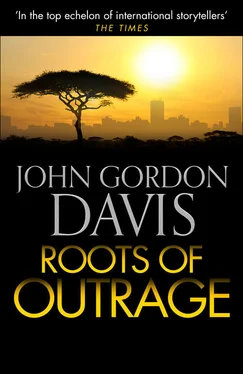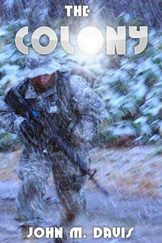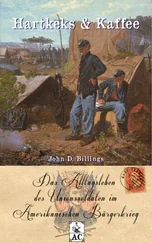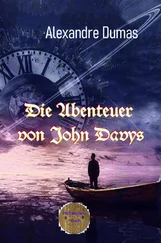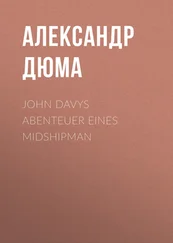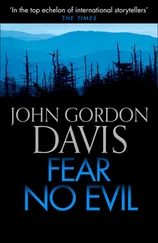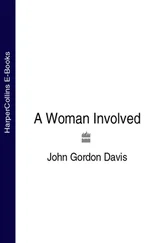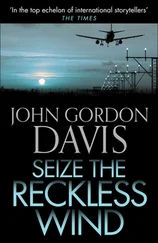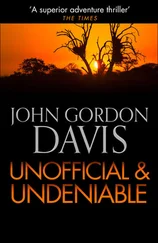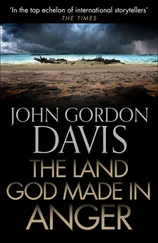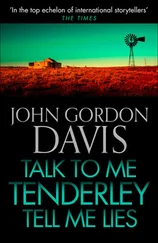‘Sooner or later innocent people are going to get killed, and Mandela will lose his moral high ground.’
‘It is our policy that there will be no loss of human life.’
Our policy? Jesus, that worried him. ‘Patti, you aren’t involved in any of this, are you?’
‘Of course not, I mean it’s ANC policy, made loud and clear at the start of the armed struggle. Mandela is a very principled man.’
‘Yeah, but how principled are all his boys scattered across the country? How long before one acts on his own initiative and blows up a crowded railway station? Mandela may be smart, but he can’t be everywhere at once keeping his hitmen under control.’
‘“Hitmen”,’ she said quietly, ‘is hardly the right word for freedom fighters. However, yes – there is a risk that life will be taken, arid I agree that’s regrettable, and it’s our policy to avoid it. But history is full of human life being taken in the struggle for freedom, Luke – it’s sad, but sometimes it’s a risk that has to be taken. Good God, how many lives are the Americans taking every day in Vietnam, as we speak? How many lives did the British take in establishing their empire? How many lives of Aborigines did the Australians take? How many Maoris were slaughtered in New Zealand? Red Indians in America? Who started the barbaric custom of scalping in America? Not the Indians, but the white settlers, to claim a bounty from the government for every Indian they killed. How many lives did Castro have to take in Cuba?’ (Oh Jesus, it worried him that she saw nothing wrong with communism.) ‘God, how many people did the South African police shoot at Sharpeville? The history of freedom is soaked in blood. This country’s history is soaked in blood. So don’t expect “us” to be too squeamish about the risk of a little more blood – regrettable though that is.’
Regrettable … Jesus, she frightened him when she talked like that. Out there bombs were going off and the police were scouring the land for Nelson Mandela – and where was she five nights a week when he couldn’t see her? He held a finger out at her perfect nose. ‘As long as you have nothing to do with that blood.’
She pretended to bite at his finger and grinned. ‘It’s not the blood that worries you, is it, darling – it’s me? Us. And the police. The Immorality Act. Boy, that’s typical South African liberal schizophrenia! All talk and no do. “Blood is historically inevitable, it’s academically necessary – as long as it’s not on my fair hands. Oh, apartheid is brutal, oh, apartheid must be toppled, and to do so there’ll be blood – but I can’t lift a finger in case a spot falls on me! So, alas, I can do nothing” …’
‘I do nothing? I write my articles for Drum , and the Globe. What I want to know is what you do, Patti?’
‘ Well she said reasonably, ‘I run Gandhi Garments. I make nice cheap dresses and pants for “kaffirs” …’
‘And that’s all?’
‘That’s all, darling. Please stop worrying …’
Michael Sullivan was a geography teacher, twenty-seven years old. It was a cold winter’s afternoon and he wore a hat and overcoat as he hurried into Johannesburg railway station, his collar turned up. He was carrying a large, new, cheap suitcase. He made his way to the platforms. Some white people were already waiting for the 5.15 train, where the whites-only first-class coaches would pull up. Further down the platform, where the second-class coaches would stop, a good number of Coloured people were waiting. Past them, where the third-class coaches would be, many more blacks were waiting.
Michael Sullivan walked to a bench marked ‘Europeans Only’. where an elderly woman was sitting with her two grandchildren. They moved up to make space for him. Sullivan placed his suitcase down beside him at the end, then moved it back to make it less conspicuous. He consulted his watch, then began to read a newspaper.
It was fifteen minutes before the first rush-hour train was due. As the minutes ticked by the long platform began to fill up. The blacks and Coloureds hurried past Sullivan, and the whites began to collect in the area in front of him, waiting impatiently. Michael Sullivan looked at his newspaper sightlessly. By five o’clock there were at least two hundred people, he estimated. Over there on the big concourse people were now hurrying in all directions to different platforms. Michael Sullivan stood up. He folded his newspaper and moved away down the crowded platform, trying to look like a man wanting to stretch his legs. He wandered off through the throng, tapping his newspaper on his leg. When he reached the concourse he increased his pace.
He strode away through the crowd, side-stepping people, until he got to the big entrance, then he broke into a run. He tried to make it a jog, like a man in a bit of a hurry – he had practised this, and timed the distances involved – but panic gripped him and he sprinted, dodging people, making for the two telephone boxes across the parking area. He raced up to the nearest box; across the dial was his handwritten adhesive tape reading ‘Out of Order’. He ripped it off, rammed coins into the slot and dialled 999 feverishly.
He shouted: ‘There’s a bomb in a suitcase about to go off in ten minutes on Johannesburg Station! Clear the area! This is a warning from the anti-apartheid forces of freedom!’
He slammed down the telephone, and he felt the vomit rise in his guts. He clutched his chest and reeled out of the box, taking deep breaths. But once the vomit was forced back, what he felt was elation. He had done it! He had done his duty as instructed! Only he could have done it because no black man in his cell could have sat down on a Europeans-Only bench. He had done it! And he’d given the bastards enough time to clear the station – a lot of Johannesburg’s first-class whites-only passengers would be very late getting home tonight. He lifted his head to listen for the police sirens: but instead he heard a thud. He jerked, and looked at the big station, and he saw glass flying up into the air. He stared, horrified, aghast. Then he heard the screams, and saw the pandemonium, the people reeling out.
Michael Sullivan stared in horror. Then he vomited. He retched and staggered away into rush-hour Johannesburg.
Politics. They tried not to talk about politics, but those bombs kept going off, and now lives were going up with them. Patti was shaken when they heard of the first life lost; she was absolutely shocked by the Johannesburg Station blast that killed nine people and wounded over thirty. But she vehemently denied that any of them were Mandela’s bombs – they must have been Poqo’s, or that white student group called the African Resistance Movement.
‘Our policy is no loss of life … And anyway what alternative is there? We can’t wage a guerrilla war like Castro did because we haven’t got Cuba’s mountains and jungles, and South Africa is buffered by the European colonies to the north – Mozambique, Rhodesia, Angola. We have no option except classical urban guerrilla warfare.’
Jesus. Classic urban guerrilla warfare? ‘How do you know about urban guerrilla warfare?’
‘I don’t know anything – you’re the one who’s had the military training, not me. But it’s common sense – guerrillas need sanctuaries when the pressure is on, like mountains and jungles. And friendly neighbouring states where they can get supplies. Well, the ANC hasn’t got that.’
‘South Africa has got mountains and dense bush. The mountains of Basutoland, the Drakensberg, Swaziland, all that vast bush –’
Читать дальше
